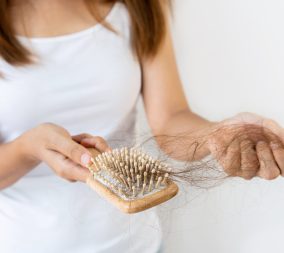A very common concern for our postpartum patients is hair loss. I know for certain my wife was not happy seeing clumps of hair come out in the shower or while styling her hair. Like most new moms, she immediately thought something must be wrong and that all her hormones needed to be checked. In actuality, postpartum hair loss is very common. And yes it is caused by hormones; however most of the time this is just a natural process. Let’s take a deeper look.
Postpartum hair loss usually begins around 3 months postpartum and can last 3-6 months. Once hair loss stops, most women’s hair will return to a normal growing stage and eventually return to their normal thickness and appearance, often by their baby’s first birthday. Some women say their hair just remains a little bit thinner after having children.
The hair loss is a result of the hormonal changes that occur post delivery, notably a low estrogen state. Interestingly, during their pregnancies, most women enjoy several months of quality hair growth. With the drop in estrogen postpartum, the hair transitions form a growth cycle to a shedding cycle.
Many women are interested in preventing postpartum hair loss, but unfortunately it is a natural process. There are some strategies to make it less noticeable, however. For example, using volumizing shampoos, being gentle with hair during brushing/drying/styling (no tight ponytails etc.), or trying a new style can help.
For most women, no diagnostic testing is needed when they notice this postpartum hair loss. If it is just excessive or continues for more than 6 months, one could consider checking thyroid function. Hypothyroidism can affect hair as well, but a large majority of women with postpartum hair loss have normal thyroid function. Interestingly also, it is hard to quantify how much hair loss is too much. I’ve read that women should expect to lose more than 100 hairs a day during this shedding timeframe. How would it even be possible to count that!?! If hair shedding continues past their baby’s first birthday, a mom can discuss with their doctor other possible etiologies.
I hope this helps clear up a very common postpartum concern.


















